Wolfram Alpha
by Stephen M. Walker II, Co-Founder / CEO
Top tip
What is Wolfram Alpha?
Wolfram Alpha is a computational knowledge engine or answer engine developed by Wolfram Research. It is an online service that answers factual queries directly by computing the answer from externally sourced "curated data", rather than providing a list of documents or web pages that might contain the answer as a search engine might.
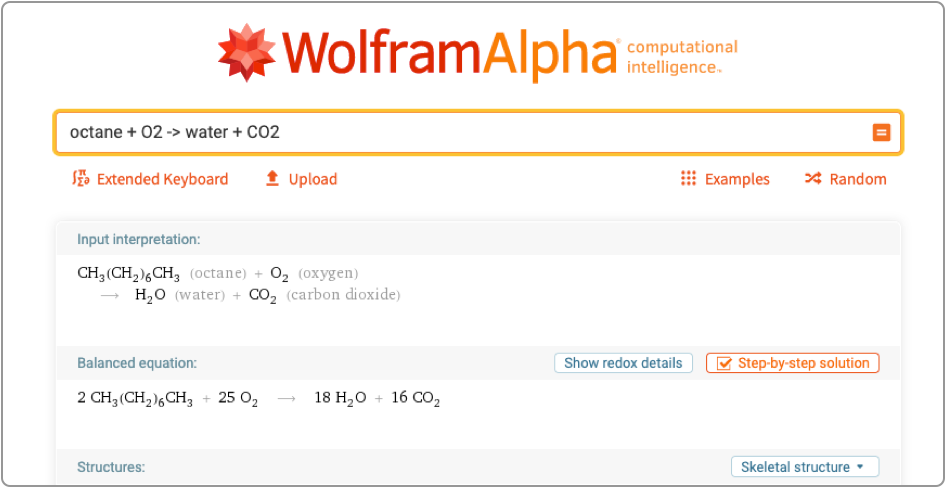
Wolfram Alpha uses a collection of algorithms, a set of curated data, and a linguistic processing for inputs to compute answers and visual outputs. The curated data is sourced from many areas of knowledge, including physical sciences, culture, geography, weather, cooking, business, music, etc. The data is kept up to date with a team of researchers.
Wolfram Alpha is designed to handle natural language inputs, making it more user-friendly than traditional search engines. It can respond to factual questions, perform calculations, and generate visualizations.
How does Wolfram Alpha work?
Wolfram Alpha works by accepting free-form linguistic input and generating results based on a vast array of algorithms and data. It is built on Mathematica, a powerful computational software platform, and utilizes its sophisticated algorithms for various types of computations, including logical, numerical, graphical, and symbolic computations.
Wolfram Alpha enables users to obtain precise answers and visualizations by simply entering questions into a text field. Leveraging a vast knowledge base of meticulously curated and structured data, sourced from a variety of authoritative texts and websites, the platform excels at interpreting and computing responses to fact-based queries phrased in natural language.
The system is designed to handle both pure computations involving numbers or formulas you enter, as well as more complex queries that require it to pull from its extensive knowledge base. This knowledge base is continually updated and expanded, allowing Wolfram Alpha to provide relevant and accurate information across a wide range of topics.
The technology that powers the Wolfram Knowledgebase, which is the foundation of Wolfram Alpha, is a combination of curated data, computational algorithms, and the Wolfram Language. The Knowledgebase is the world's largest and broadest repository of computable knowledge, containing trillions of data elements and algorithms that encapsulate methods and models from thousands of domains.
Key aspects of the Wolfram Knowledgebase technology include:
- Curated Expert Knowledge: The data and methods in the Knowledgebase are derived from primary sources, often not available on the web, and are carefully curated by experts.
- Continuous Data Feeds: The Knowledgebase is updated every millisecond with the latest data, ensuring that the information remains current.
- Computable Data: All data within the Knowledgebase is structured to be immediately usable for computation within the Wolfram Language, which is a symbolic computational language.
- Large-Scale Automated Checking: The Knowledgebase undergoes extensive validation using Wolfram's proprietary tools and data to ensure accuracy and reliability.
- Integration with Mathematica: The Knowledgebase leverages the computational power of Mathematica, which provides a high-level starting point and includes tens of thousands of original algorithms as well as many sophisticated algorithms already built into Mathematica.
Wolfram Alpha stands out from conventional search engines and knowledge bases due to its ability to execute sophisticated computations. The system is engineered to deliver results with utmost clarity, aiding user comprehension. At the core of its computational proficiency is the Wolfram Language, which facilitates the transformation of the Knowledgebase's curated data into a computable format, ensuring accurate and reliable outcomes. This synergy of expertly curated knowledge, real-time updates, and computational prowess empowers Wolfram Alpha to tackle complex queries and yield precise answers.
What is the history of Wolfram Alpha?
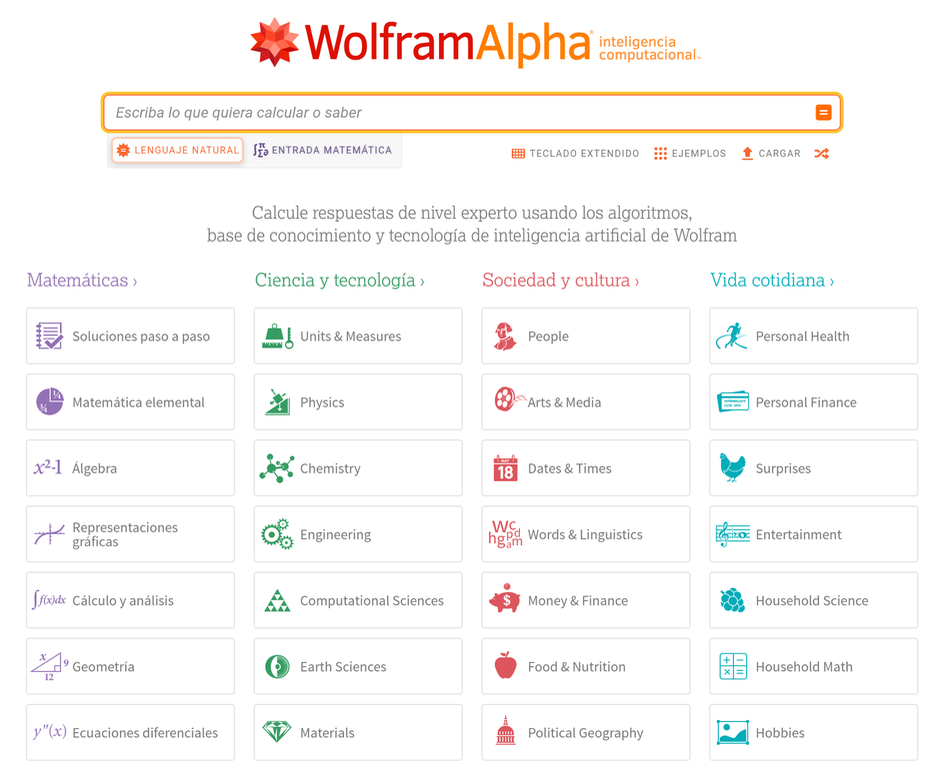
Wolfram Alpha, a computational knowledge engine, was released on May 18, 2009. The engine was based on Wolfram's earlier product, Wolfram Mathematica, a technical computing platform. The development of Wolfram Alpha was initiated by Stephen Wolfram, who had a rich history in the field of computing and science. He created the first modern computer algebra system, which was released commercially in 1981, and later founded Wolfram Research.
The development of Mathematica began in late 1986, and the first version was released on June 23, 1988. Mathematica was hailed as a major advance in computing and its popularity grew rapidly, establishing Wolfram Research as a world leader in the software industry.
In 2007, Wolfram Research released its first computable data in Mathematica, and around the same time, the construction of what would become Wolfram Alpha began. Wolfram Alpha was designed to compute answers to natural-language queries based on a large collection of algorithms and curated data.
The goal of Wolfram Alpha is to make all systematic knowledge immediately computable and accessible to everyone. It aims to collect and curate all objective data, implement every known model, method, and algorithm, and make it possible to compute whatever can be computed about anything.
Since its launch, Wolfram Alpha has been continuously developed and improved. For instance, a Spanish language version was announced in July 2022. The engine has also been integrated into other platforms; for example, in August 2009, Bing struck a licensing deal with Wolfram Alpha.
Wolfram Alpha, built on the foundation of Wolfram Mathematica, represents a significant step in the quest to make knowledge computable and accessible to all. Its development and continuous improvement reflect the ambitious vision of its creator, Stephen Wolfram, and his commitment to advancing the field of computational knowledge.
What are some common use cases for Wolfram Alpha?
Wolfram Alpha finds its utility in a myriad of applications that demand intricate data handling and swift, precise computation. In the realm of education, particularly in mathematics and science, it serves as a powerful tool for solving equations, visualizing functions, and computing integrals.
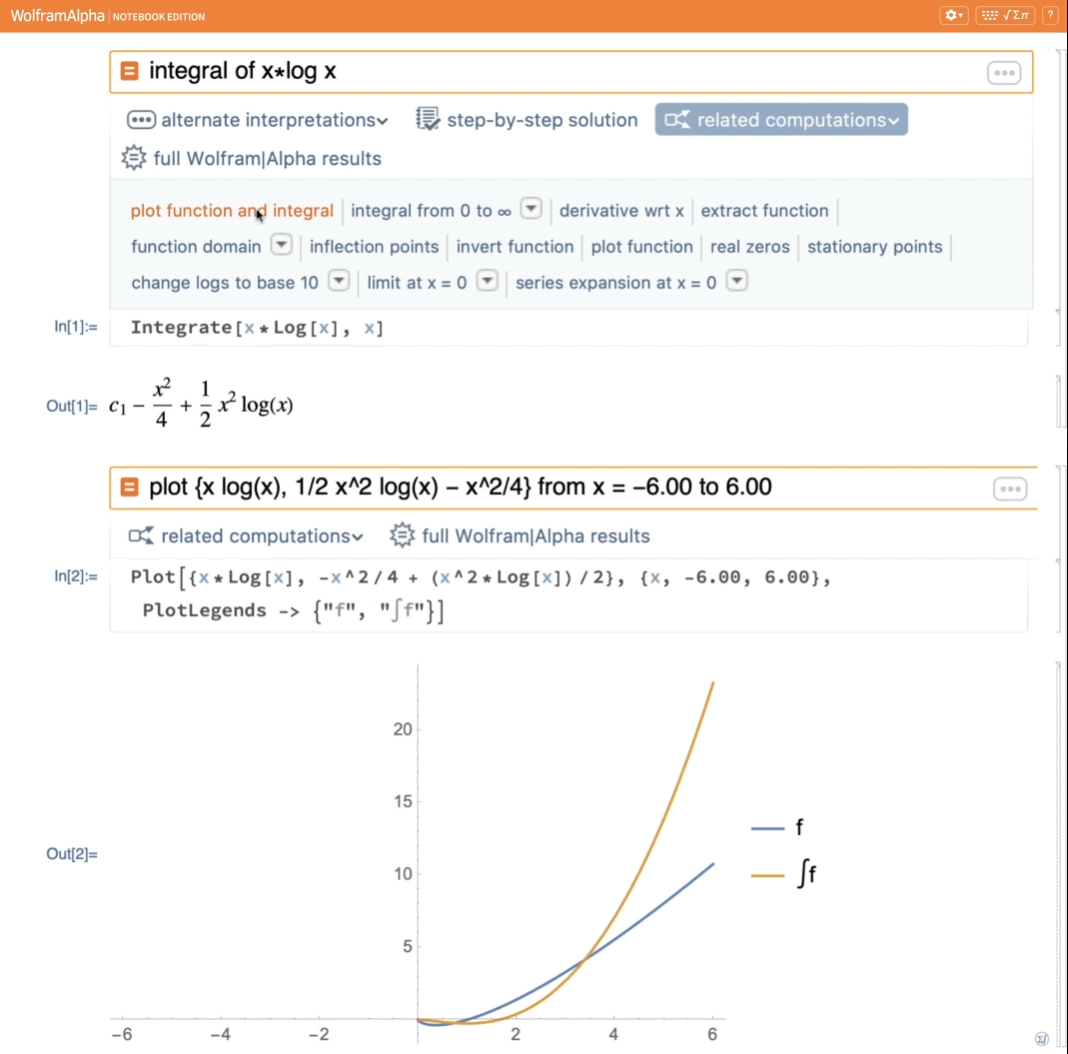
It also proves to be an invaluable asset in data analysis, capable of processing vast data quantities and generating insightful visualizations. The engine's natural language understanding and factual answer provision make it a fitting choice for personal assistant applications. Moreover, various research fields employ Wolfram Alpha to compute answers and generate visualizations based on curated data.
What are the main features of Wolfram Alpha?
Wolfram Alpha distinguishes itself from traditional search engines through its unique features. As a Computational Knowledge Engine, it computes answers to queries using a vast collection of curated data and algorithms, rather than simply returning a list of potential sources. This approach is enhanced by its ability to understand natural language inputs, making it user-friendly and intuitive.
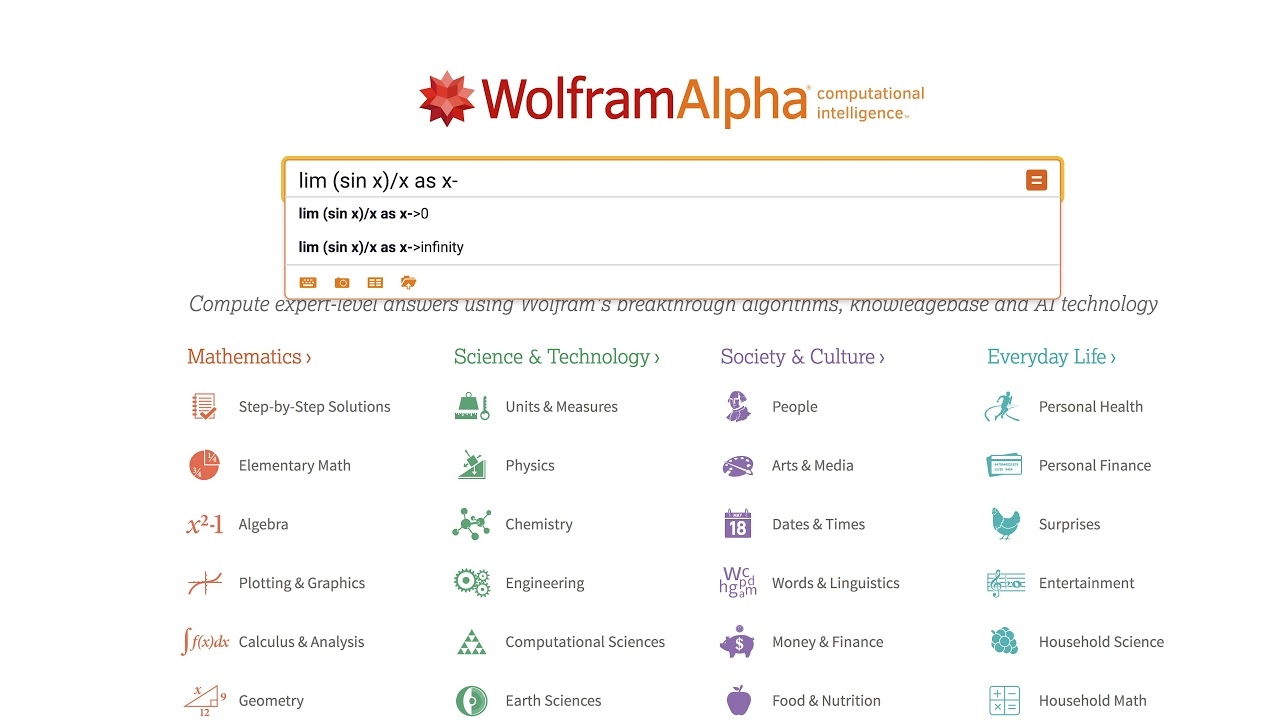
Wolfram Alpha dynamically computes answers and generates visual outputs based on the input query, creating an interactive and engaging user experience.
Its curated data spans a wide range of subjects, from mathematics and science to culture and geography, making it a versatile tool for information retrieval.
For many mathematical problems, Wolfram Alpha provides not only the answer but also a step-by-step solution, proving invaluable for education and learning.
Furthermore, its computational abilities are integrated into other services such as Apple's Siri and Microsoft's Bing, extending its reach and utility.
What are some common Wolfram Alpha tools?
Wolfram Alpha offers a variety of tools and features to enhance its computational capabilities. The premium version, Wolfram Alpha Pro, provides advanced features like step-by-step solutions and the option to upload data for analysis.
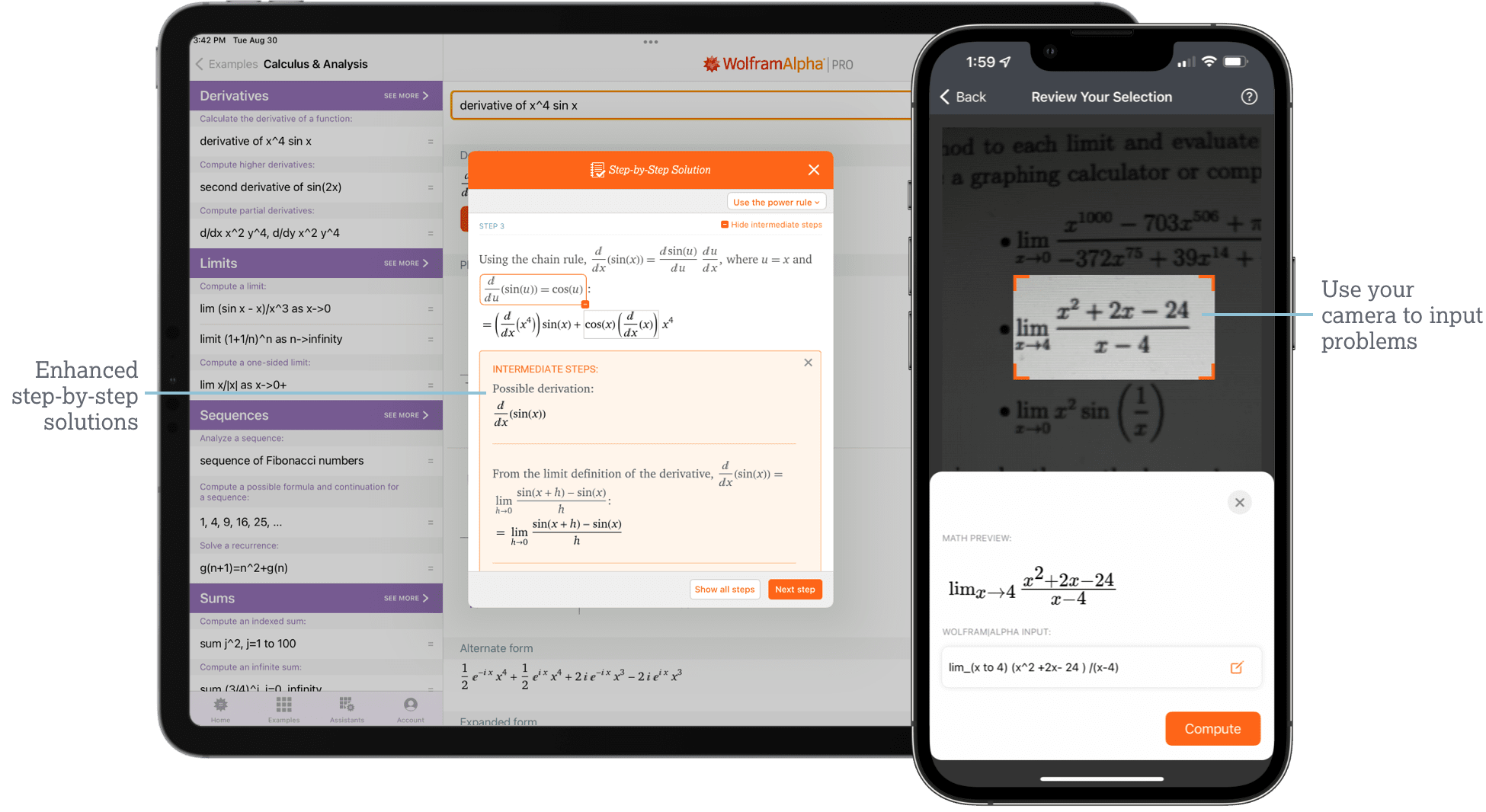
Wolfram Alpha Widgets, small applications that can be embedded in various platforms, extend the engine's functionality to websites, blogs, and documents. Additionally, the Wolfram Alpha API enables developers to incorporate the computational abilities of Wolfram Alpha into their own applications.
What is the significance and impact of Wolfram Alpha?
Wolfram Alpha has significantly impacted the way we access information by providing direct, factual responses to queries. This innovation has set a new standard for computational knowledge engines and paved the way for modern voice assistants like Siri, Alexa, and Google Assistant.
Leveraging computation and curated data, Wolfram Alpha has demonstrated the potential for generating new knowledge and insights, continually expanding its utility and versatility with features such as image identification, weather forecasts, and comparison tools. Through its API, Wolfram Alpha has extended its reach beyond the web, integrating with various devices and applications, making it an integral part of numerous software and online services, and further amplifying its impact.
What are the leading computational knowledge engines for AI projects?
Wolfram Alpha is one of the leading computational knowledge engines used in AI projects. Its ability to understand natural language inputs and compute answers based on curated data makes it a powerful tool for AI applications.
Wolfram Alpha's curated data is sourced from many areas of knowledge, making it versatile for various AI applications. It can handle various conditions and is optimized for fast and accurate computations.
Wolfram Alpha can be used with various programming languages, making it flexible for different development environments. It also provides an API for developers to integrate its computational abilities into their own applications.
Wolfram Alpha is designed to handle large-scale datasets, support real-time analytics and queries, and offer improved performance and reduced latency in AI applications. It also provides efficient storage and indexing of data and can handle data derived from complex data types such as images, videos, and natural language text.
What are the criticisms of Wolfram Alpha?
Despite its powerful computational capabilities, Wolfram Alpha has faced some criticisms. One of the main criticisms is its limited natural language understanding. While it is designed to process natural language queries, it can struggle with ambiguous or complex queries, leading to incorrect or unexpected results.
Another criticism is its heavy reliance on curated data for computations. This dependence means that it may not always provide the most up-to-date information, and its accuracy is as good as the quality of the curated data it uses.
Wolfram Alpha also offers limited computational time for free users. For more complex computations or extended usage, users are required to upgrade to the premium version, which has been a point of contention among some users.
The interface of Wolfram Alpha, while robust, has been described as complex and less user-friendly compared to traditional search engines. This complexity can pose a challenge for new or less tech-savvy users.
Despite these criticisms, many users find that the benefits of using Wolfram Alpha, such as its vast computational abilities and extensive curated data, outweigh these potential drawbacks.
FAQs
Does Klu.ai support Wolfram Alpha?
Yes, Klu has built-in Wolfram Alpha support, here's a code example.
wolfram_alpha_topics = [
"math homework",
"wolfram alpha",
"math homework",
"world's definitive source",
"world's definitive source",
"world's definitive source",
"math problems",
"math problems",
"math problems",
"instant expert knowledge",
"instant expert knowledge",
"instant expert knowledge",
"generate reports",
"free version",
"free version",
"in app items",
"wolfram language",
"wolfram language",
"wolfram language",
"development led",
"vast collection",
"answer queries",
"stephen wolfram",
"computable knowledge",
"new version",
"new version",
"data",
"math",
"math",
"math",
"math",
"math",
"math",
"math",
"math",
"science",
"answers",
"calculate",
"calculate",
"access",
"access",
"calculate",
"app app app app app app app",
"app app app app app app app",
"app app app app app apps apps",
"almost everything",
"apps",
"computation",
"algorithms",
"access",
"examples",
"answer",
"almost anything",
"relevant",
"students",
"access",
"additional information",
"research",
"sign",
"example",
"functions",
"domains",
"domains",
"website",
"website",
"developer developer",
"developer",
"ads ads physics physics",
"test",
"power",
"noticed",
"developers",
"history",
"form",
"statistics",
"solutions",
"sign",
"functions",
"domains",
"sign",
"website",
"tool",
"developer",
"ads",
"physics",
"graphs",
"test",
"development",
"suggestions",
"search",
"power",
"finance",
"version",
"noticed",
"calculations",
"concepts",
"queries",
"google",
"pay",
"users",
"languages",
"solutions",
"class",
"developers",
"basic",
"solve",
"enhance",
"explore",
"calculus",
"quality",
"create",
"fun",
"visit",
"history",
"form",
"develop",
"web",
"statistics",
"wrong"
]
async def get_wolfram_results(query):
try:
response = await klu.action.query_wolfram_alpha(query)
print('Wolfram Alpha Results:', response)
except Exception as error:
print('Error fetching Wolfram Alpha results:', error)
for topic in wolfram_alpha_topics:
asyncio.run(get_wolfram_results(topic))